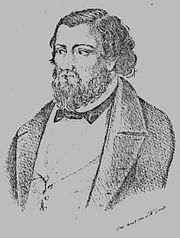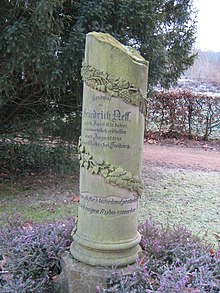Friedrich Neff
Friedrich Neff (born April 26, 1821 in Rümmingen ; † August 9, 1849 in Freiburg im Breisgau ) was a German student and revolutionary .
Life
Neff came from an orderly background. His father, a master cooper , was considered wealthy. After the village school, Friedrich Neff attended the high school in Lörrach . At the father's request, he then completed an apprenticeship as a cooper and then went on a hike. This led him to Vaud and Geneva , where he got to know both the French language and revolutionary ideas. He came into contact with Heinrich Zschokke and was prepared by him for studying in Aarau , as he had taken up the cooperative profession only for the sake of his father and was striving for a higher education. He began studying law and philosophy in Freiburg i. Br. And subsequently moved to the universities in Tübingen, Munich and Heidelberg. During his studies in 1845 he became a member of the Neckarbund fraternity in Heidelberg. In 1847 he stayed temporarily in London , where he was influenced by Giuseppe Mazzini . He spent the winter semester of 1847/48 in Basel .
Neff, fascinated by the French Revolution , took part in all three Baden uprisings in 1848/49 . In the moderately liberal Baden Oberland he was considered a radical republican who propagated the violent overthrow.
On April 20, 1848, Neff joined Freischar Weißhaar- Struve in Lörrach , while Freischar Hecker was defeated by Hessian federal troops near Kandern . A reference in the literature according to which Neff made a significant contribution to the liberation of Gustav Struve from captivity in Säckingen on April 21, 1848, confirms neither Struve himself nor the main actor in the liberation Theodor Mögling . Neff agitated during the September uprising in 1848 ( Struve Putsch ) in the Markgräflerland for the revolution, and he also confiscated community coffers for the revolution. At the end of 1848, Neff in Biel , Switzerland, together with Johann Philipp Becker, issued several promissory notes in favor of a German republic.
At the beginning of 1849 he stayed in Paris and from there, at the beginning of the third Baden uprising in 1849 (soldiers' revolt), he went to the Baden-Swiss border. On May 15, 1849, the Oberamtmann von Lörrach called on the communities in his district not to obey Neff's call for a parade.
After a counter-revolution took place on July 2, 1849 in Freiburg, the seat of the provisional government, Neff tried - against the orders of the Baden War Minister Maximilian Werner - to flee to France in order to recruit new troops there. But he never got there. Rather, he was arrested on July 3, 1849 in Breisach , meanwhile advertised for arrest in a wanted letter, because there attentive customs officials had found a suitcase with his name tag on it.
death
On August 8, 1849 Neff was brought to court in the Basler Hof in Freiburg im Breisgau. The main point of charge was that he had already participated in the earlier highly treasonable ventures, namely in the attempted overturning by Struve in September of last year by plundering state coffers and other crimes. Furthermore, in May 1849 he had called the German refugees abroad to support the revolution in the Grand Duchy, organized them and from June 5th to 29th as an armed warrior with them the campaign via Heidelberg, Schoenau, Heddesbach to Durlach and Rastatt in the capacity of one Made war commissioner . During the trial he did not deny anything that he was accused of and stood by his works and deeds. He was sentenced to death that same day.
The execution of the judgment took place one day later, on the morning of August 9, 1849, by shooting in the Freiburg cemetery in Wiehre . Johann Maximilian Dortu , a participant in the March Revolution , had already been executed there on July 31, 1849 .
Before his death, Neff wrote a farewell letter to his mother Anna Maria Neff, née Scherer, in which he wrote:
“ One more thing, dear, dearly beloved mother: be firm and steadfast in this unlucky news. As for me, tomorrow I will go to my death as calmly as I once walked in our garden [...] I would, if I had ten lives to give them all for my cause ”.
In 1854 the mother donated a piece of land in Rümmingen to the municipality of Rümmingen with the stipulation that a cemetery be established there for the municipality and thus also for her and her son, whose bones she had secretly transferred. Until then, burials took place in the neighboring town of Binzen . She dug an honorable grave with a pillar for her son on the property. However, the inscription on the grave column had to be chiseled away again on the orders of the grand ducal government of Baden; it was only refitted in 1918 and is now in the cemetery in Karl-Friedrich-Böhringer-Straße in Rümmingen, which was relocated from 1960.
" Anyone who died like you for the fatherland has earned eternal fame "
Planned commemorations at Neff's grave in 1898, 50 years after the revolutions, were prohibited by the grand ducal district office in Lörrach. Neff was not officially recognized until 1974, when social democrats such as Professor Klaus-Dieter Osswald and Peter Reinelt laid a wreath in the new cemetery in Rümmingen on the 125th anniversary of his death.
Works
- Contributions to peasant policy or how to help the resigned middle class . Philadelphia 1849 (sic!) - Place of printing, presumably to mislead the censorship authorities, falsifies Google digitization
- The men of action and their opponents . Basel 1848
- My share in the second elevation of the sign of the Baden people in September 1848 . In: MW Löwenfels, F. Neff, G. Thielmann: The second republican uprising in Baden . Verlag J. Fr. Seul, Basel 1848, pp. 41-61 online at the Badische Landesbibliothek
rating
Today there are several Friedrich-Neff-Strasse (in Rümmingen, Lörrach and Freiburg i. Br.) In Rümmingen there is a sign at the house where Neff was born. To this day, opinions differ as to whether Neff can be classified as a hero or an extremist . In several of his writings, Neff clearly admitted to using violence. On the basis of his experiences in the September uprising , 1848, he came to the assessment “that republics cannot be founded by doing good and being benevolent, as we wanted to do; the old guilt can unfortunately only be washed off with blood ” .
literature
- Helge Dvorak: Biographical Lexicon of the German Burschenschaft. Volume I: Politicians. Sub-Volume 4: M-Q. Winter, Heidelberg 2000, ISBN 3-8253-1118-X , pp. 186-187.
- Theodor Scholz: Revolutionaries ... - The uprising of 1849 and its consequences in the Markgräflerland . Publishing house of the Markgräfler Druckerei und Verlagsgesellschaft mbH, Müllheim (Baden) 1926
- Thomas K. Kuhn : Revolution and New Religion - The 'red republican' Johann Friedrich Neff from Rümmingen . In: The Markgräflerland. Vol. 2/1999, Schopfheim 1999, pp. 68–86 Digitalised version of the Freiburg University Library
- Hellmuth Wetz: The last days of the freedom fighter of 1848/49 Friedrich Neff from Rümmingen . In: The Markgräflerland. Issue 3/4, 1973, Schopfheim 1973, pp. 176–186 Digital copy of the Freiburg University Library
- Hellmuth Wetz: The volleys of the Prussian pelotons crashed three times in 1849 at the old cemetery in the Wiehre near Freiburg. In: Badische Heimat. Mein Heimatland, Issue 2/1974, pp. 221–248, here in particular pp. 227–239
- Josef Edmund Jörg : XLVI. From my diary. In: Historisch -politische Blätter für das Catholic Deutschland , Volume 55 (1865), pp. 853–868; here in particular pp. 856–868 Google digitized version
Web links
- Publication on the Baden revolutions with a short portrait of Friedrich Neff (PDF file; 510 kB)
Individual evidence
- ↑ see Freiburg State Archives: Binzen LÖ; Evangelical Congregation: Register of registry 1799-1823, picture 380, entry no.12
- ↑ see Freiburg State Archives: Wiehre FR; Catholic community: registry book 1844-1870, image 202
- ^ Josef Edmund Jörg: XLVI. From my diary. In: Historical-political papers for Catholic Germany , Volume 55 (1865), p. 864
- ^ Theodor Scholz: Revolutionaries ... - The uprising of 1849 and its consequences in the Markgräflerland . Verlag der Markgräfler Druckerei und Verlagsgesellschaft mbH, Müllheim (Baden) 1926, p. 157.
- ^ Gustav Struve: History of the three popular uprisings in Baden . Publishing house by Jenni, Sohn, Bern 1849; changed reprint: Verlag Rombach, Freiburg i.Br. 1980, pp. 71-72
- ↑ Dr. Friedrich Hecker: uprising of the people in Baden for the German republic in spring 1848 . Basel 1848, pp. 93-94
- ^ Frank Engehausen, Brief history of the revolution 1848/49 in Baden, B. Braun Buchverlag, Karlsruhe 2010, page 184
- ↑ a b c Horst Donner: Friedrich Neff: A rebellious Rümminger in the best sense of the word. In: Badische Zeitung online. July 31, 2009. Retrieved July 12, 2009 .
| personal data | |
|---|---|
| SURNAME | Neff, Friedrich |
| BRIEF DESCRIPTION | German revolutionary |
| DATE OF BIRTH | April 26, 1821 |
| PLACE OF BIRTH | Rümmingen |
| DATE OF DEATH | August 9, 1849 |
| Place of death | Freiburg in Breisgau |


